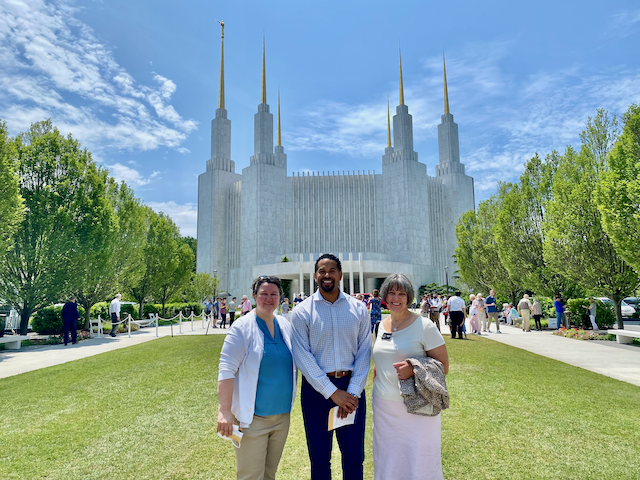Dear Family,
In some respects, it feels like we’ve been gradually transitioning into summer for a month and a half. I’m not sure why that is, but there’s no denying we’re fully immersed in it now.
The end of the school year has brought a significant change in employment status for three of our house’s four occupants.
Grace
For Grace summer brings something resembling full-time employment at the neighborhood pool. In addition to lifeguarding, she is now something called a pool operator. I don’t know all of what that job entails, but here in hyper-cautious Montgomery County, where it honestly surprises me that I’m allowed to mow the lawn without a license and people call the cops at the sound of fireworks, Grace’s pool operator license apparently allows her to put chorine in the pool, turn the pump on, boss around other lifeguards, and, I don’t know, put the kickboards away and do whatever else operating a swimming pool requires.
But she’s not doing any of those things this week. This week she is at young women’s camp at Deep Creek Lake in the wilds of Western Maryland. Grace is the camp president. I don’t know what that means and didn’t even know “camp president” was a thing until very recently.9 But one of Grace’s gifts is making people feel included in things and I’m sure she’s presiding well.
I asked Grace to text me some pictures from camp for me to include here. I don’t actually expect her to do that (it’s possible she is not even allowed to do that). And she won’t be home until after my self-imposed month-end deadline. And so instead I include a picture of a tire with a big gaping hole in the sidewall courtesy of an unfortunately placed curb in Columbia. Grace holds this rogue curb (or roadside gutter, or whatever it was that reportedly materialized out of nowhere) wholly responsible for the tire’s demise. This strikes me as unlikely, but she’s still a pretty good driver … for a teenager.

Ari
Ari’s job at Kids After Hours is also different now that school is out. During this time of year, the program transitions from a before- and after-school care kind of thing to more of a summer day camp. Ari is a counselor for something called the “Junior Adventure Camp,” where every day the kids are bused to a different activity — water park, beach cookout, river tubing, zip-lining, etc. It actually sounds like a pretty fun job — or it would if it didn’t require keeping track of a bunch of 2nd, 3rd and 4th graders. But Ari seems to enjoy it.


A side benefit of the new job is that Ari’s hour-long, two-bus commute to Garrett Park Elementary School five miles away has been replaced by a half-mile walk up the hill to Forest Knolls Elementary. It would be nice if Ari could make this a permanent change when school resumes in the fall, but I guess we’ll see.
The open house closes
June finally saw the end of the years-in-the-making Washington D.C. Temple open house, which means we can finally throw away all the leftover posters, pass-along cards, and other junk that has been cluttering our lives for months. In reality, it has consumed more of Crystal’s life than mine because of her Church position and involvement with the committee. But it’s been fun following her around and overhearing the many open-house-related Zoom calls she took from her upstairs office, which abuts our bedroom.
The first two weeks of June saw us (Crystal mostly) escorting our final small groups of friends and acquaintances through the temple. These notably included Montgomery County Councilmember Will Jawando10

Then, on the very last day of the open house, Crystal and I got to show our old friends Mike and Thi Trippett the temple. Mike and I were work colleagues almost 25 years ago and it was fun to have an excuse to reconnect. The temple was packed and the ushers were trying to herd people through as efficiently as possible. “Please keep moving…” they kept saying, which got annoying after a while. But Crystal was wearing her official nametag, which we felt gave us license to ignore the ushers.
And so we ignored the ushers. We plopped ourselves down on four seats in the middle of one of the endowment rooms and talked for about 10 minutes while the crowd streamed by. Being rebellious in the temple is exhilarating.

(After the temple, we went to dinner and they paid. So it all worked out well for us.)
Temple dedication choir
The open house ended nearly three weeks ago, but the dedication is not until August. Three sessions are scheduled and Crystal and I will get to sing in the the choir at the third of these.
I am looking forward to this, and not just because it means we’ll have good seats. (The chairs in the seventh floor assembly room are no good, but the choir seats are nice.)
I’m mostly looking forward to it because, for all the uplifting worship that happens in the temple, when was the last time you had occasion to sing there? The Washington D.C. Temple has two organs and I happen to have played both of them. But these were unusual occasions.
Rehearsals began this month and I’m discovering that it would help if I actually knew how to sing. I mean, I know what sound all the notes on the page make — I can get the pitch right — but I don’t actually know how to sing. Or, as Crystal describes it, “He sings for comic effect.”
Being able to get the notes right without having to listen to the accompanist pound it out a bunch of times probably puts me somewhere in the top quartile of church choristers.11 Outside of ward and stake choirs, however, I am somewhat out of my depth.
We were expected to arrive at the first rehearsal having already learned the music, which I had done, and so much of the two hours was devoted to diction. Diction as a musical concept is completely foreign to me.
The choir director amused me every time he described the very precise way he wanted a certain vowel pronounced. “Most people sing it this way, which is wrong. If you were in one of Mack Wilberg’s choirs he would have you pronounce it like this, which is fine, but I actually prefer that you pronounce it like this.” I gathered from context that he was pronouncing the vowel in three different ways, but I honestly couldn’t distinguish among any of them. And so I just try to blend in with whoever’s standing next to me. Which, come to think of it, is what I’m pretty sure you’re supposed to do in a choir anyway.
As it happens, one of the people standing next to me was Joel Cundick, a member of the Olney Ward and grandson of the late, great Tabernacle organist Robert Cundick. Joel rolled into the first rehearsal unaware that the music had been distributed beforehand and, not surprisingly, still got everything right.
June 4th: Morning failure, afternoon rejection
The choir was scheduled to rehearse from 10 a.m. to noon on Saturday, June 4th, at the Annandale (Virginia) stake center. (Our next rehearsal is in mid-July, by which time we are expected to have all four pieces memorized. Memorizing the notes and the words will probably not be a problem for me. Memorizing how to pronounce the words might be.)
I was a few minutes late for the 10:00 rehearsal in Virginia because I had already decided I wanted to run the Baltimore 10 Miler at 7:00 that morning. I might have made it on time if I’d hit my goal time at the race, but alas, I did not. It took me an hour and 29 minutes, which it turns out was faster than most people on the course that day but not very good by any objective measure.


Traffic on the Beltway was abysmal, but I still managed to get to Annandale, duck into the handicap restroom behind the cultural hall, change out of my running clothes and into church clothes, and get into the rehearsal by 10:10 or so.
Rehearsal ran a little beyond noon, and so I then needed to hustle to get from the Annandale Virginia stake center to the Silver Spring Maryland stake center for my 1:30 interview with the visiting authorities in town to reorganize our stake presidency.
I tied my tie while driving, got nailed by that speed camera on Connecticut, just north of the Beltway in Kensington/Chevy Chase, and managed to get to my interview 15 minutes early (though without having showered or eaten anything since the race that morning).
This rest of this letter deals with the aftermath of that interview. You should feel free to bail out here unless you’re feeling voyeuristic and interested in glancing inside my broken, tortured soul. If that’s what you want, then by all means read on.
The Church’s General Handbook includes helpful instructions for how to go about asking people to serve in church positions. Because we tend to use our own private church lexicon for even the most basic things, we usually refer to these church jobs as “callings.” The relevant instruction reads:
“a person who is being considered for a calling is not notified until the calling is issued. This helps avoid embarrassment if the call is not extended.”12
General Handbook, 30.1.4
This strikes me as sound advice, and in my experience it is usually followed. There is one calling, however, for which this instruction is literally never followed. That calling is stake president.
Here is how it works for stake presidents. (This process is not described in the Handbook but I have some familiarity with it as I have been subjected to it several times.)
Two senior Church officials (usually a General Authority Seventy accompanied by an Area Seventy) parachute into town late Friday night or early Saturday morning. In advance of their arrival, they are supplied with a pile of what amount to church resumes13 containing biographical information about 1) the members of the outgoing stake presidency, 2) everyone on the high council, 3) every bishop in the stake, and 4) any other guys the outgoing stake president sees fit to include. In all, it’s not uncommon for the list to include as many as 30 people or more.
The visiting senior Church officials then spend all of Saturday morning and early afternoon interviewing each of those 30 or so guys, every one of whom knowing full well that they are being considered and evaluated for the position of stake president.
Following the interviews, in a process that is frequently likened to how King David was selected by the prophet Samuel to replace King Saul (see 1 Samuel 16) — and never, ever, ever, ever likened to how Matthias was selected to replace Judas among the 12 apostles (i.e., by casting lots, see Acts 1:26), the visiting senior Church officials discern who God wants the next stake president to be.
God, it turns out, decided to go with my little brother, Grant.
I wish to make it clear that I sincerely believe God got it right. Grant is and will be a fantastic stake president. Nothing I write below or elsewhere should be construed as my feeling otherwise.
Having said that, I have come to rather dislike the selection process. It seems to work, and I can’t really think of any other practical way to do it. But I’m not at all fond of it. Like certain other aspects of church that are not closely tethered to the gospel, the process works great for the people it works for while quietly (if unwittingly) inflicting pain on others.
The Handbook states that people should not be told they are being considered for a calling in order to avoid “embarrassment” among those who are ultimately not chosen. The language in the Handbook is chosen carefully, and I am not generally one to quibble with it. But embarrassment is not the right word here. That the Handbook gets the word wrong does not surprise me since its authors could not possibly know what it feels like to be directed to interview for the same position over and over and over again (four times in eight years in my case — three of those times while serving as a stake president’s counselor) and never be chosen. (Handbooks, not unlike the scriptures,14 are written by the chosen.) I have never felt embarrassed about it. The feeling, rather, is one of rejection.
If you are trying to think of the most tactful way of asking how it feels to be rejected by God in favor of your younger brother, I’ll save you the trouble and tell you that it feels exactly like you probably think it feels. The fact that it was the right decision is beside the point. Being able to appreciate the logic of a girl’s decision to reject you for a better guy doesn’t make you feel any better about yourself or the situation.
Nor is the sense of rejection assuaged by the fact that I don’t actually want the job. (And I honestly don’t.) I don’t imagine Grant is particularly excited about it, either. No reasonable person would be. It’s a lot of work and a lot of headache for no money. And I have sat close enough to stake presidents to know that I would be horrible at it. I don’t have the temperament for it. I don’t have the patience for it. I have a strong aversion to telling people things they do not want to hear. Though reasonably empathic (I think), I do not possess an especially charitable heart and frequently struggle with a strong predisposition to selfishness. I’m kind of a jackass. I am prone to murmuring when administrative decisions at church don’t make sense to me, as they so very often don’t.15
Even though I realize some friends from church will read this, I would not feel comfortable expressing my feelings of rejection at church. I am aware of only one culturally acceptable way for a person in my situation to react at church. And that is to say something like, “Boy, I sure am happy to have dodged that bullet!” Virtually everybody says something to this effect. Whether everybody actually feels that way is impossible to know.
To be viewed as aspiring to a church position is among our biggest cultural taboos. People go to such absurd lengths not to be seen as aspiring that they sometimes speak of the prospect of being called to a prominent church position as if it were some kind of debilitating disease that they hope to avoid contracting. These expressions strike me as disingenuous. I doubt there’s any data on this, but I would lay odds that callings to prominent church positions get turned down with considerably less frequency than callings to less prominent ones.16
Things get uncomfortable for me when the way I think I am supposed to feel about something does not align with how I actually feel about it. We are, after all, striving to become exalted, godly beings that not only do only good and righteous things but also desire only good and righteous things. Even though our theology holds that this ultimate goal is utterly unattainable without (a great deal of) divine help, and even though we believe that this help — the grace afforded by the atonement of Jesus Christ — is available to literally every person who has ever lived on earth, becoming that kind of being still seems an extraordinarily daunting task.
In those rare moments when I’m actually being 100 percent honest with myself, I have to admit that, even though I had/have no desire to be the stake president, there is a part of me that nevertheless desired to be chosen. The two desires are, of course, wholly incompatible with one another. But incompatible desires seem to be an inevitable by-product of the agency inherent in the human condition. (At least until such time as I learn how to use my agency to govern my desires as well as my actions, but that time feels like it’s still a long way off.)
At the end of stake conference, Grant walked over to me at the organ and asked if I was okay. I told him that I would be — that I just needed to get through the weekend. Which was true. Monday brought the resumption of my normal, mostly happy life and a return to my normal, mostly happy self. For some reason, I seem to be happiest when I’m not devoting all my mental energy to creating and meticulously examining the long list of everything that is wrong with me. I don’t know what it is about being compelled to interview repeatedly for a job I am clearly not cut out for that causes me to do this to myself. But perhaps Grant will exercise some compassion and see that I am kept off of future interview lists.
Either way, I am grateful beyond expression to be part of a family who love and support me in spite of it all.
Love,
Tim

Managing Editor of The Famlet Monthly
- We do love us some presidents in our church. Sometimes it seems like half the people in the pews on Sunday are in the presidency of one thing or another.
- Winning a seat on the Montgomery County Council is a bigger deal than it might sound like. With over a million residents, our county has a larger population than six states. He's a remarkable fellow. Crystal and I both enjoyed reading his recently published memoir, My Seven Black Fathers, this month, even though reading a memoir of someone 10 years younger than I makes me feel old. The local-ness of it probably had something to do with why I liked it. (He grew up in Silver Spring and it's fun to read a book where you recognize the places.) But I also just liked it. I am impressed by people who can write matter-of-factly about the racism they experience without expressing bitterness and without making me feel like it's all my fault. It makes me want to try harder.
- Here I use the term chorister in its traditional (correct) sense as "a member of a chorus or choir" as opposed to the unusual way in which many Latter-day Saints use it to refer to the person who futilely waves her arm at the front of the sanctuary during sacrament meeting. If you're wondering, the word chorister does not appear in the General Handbook. The term you're looking for is music leader (see 19.4.3.1).
- "Extending a call" is churchspeak for "asking someone to accept a church position."
- "Church resumes" are not actually a thing but that's effectively what these documents are.
- The Book of Mormon is excerpted from the record of Nephi, the fourth of six sons. We don't know whether Nephi's unchosen older brothers even kept a record. I have always had an easier time relating to Laman than to Nephi. Now I know why.
- These are merely my least embarrassing shortcomings and should not be considered an exhaustive enumeration.
- I have considerable anecdotal evidence of this from my six-and-a-half-year tenure as a bishop, which I am not at liberty to share. But my favorite example came a quarter-century ago when I was the ward mission leader and leaned that a person I recommended be called as a "stake missionary" (a now-defunct position) had turned down the calling because he didn't have the time. It should not have surprised me a month or so later when the same person somehow found the time to accept a calling into the bishopric.
- We do love us some presidents in our church. Sometimes it seems like half the people in the pews on Sunday are in the presidency of one thing or another.
- Winning a seat on the Montgomery County Council is a bigger deal than it might sound like. With over a million residents, our county has a larger population than six states. He’s a remarkable fellow. Crystal and I both enjoyed reading his recently published memoir, My Seven Black Fathers, this month, even though reading a memoir of someone 10 years younger than I makes me feel old. The local-ness of it probably had something to do with why I liked it. (He grew up in Silver Spring and it’s fun to read a book where you recognize the places.) But I also just liked it. I am impressed by people who can write matter-of-factly about the racism they experience without expressing bitterness and without making me feel like it’s all my fault. It makes me want to try harder.
- Here I use the term chorister in its traditional (correct) sense as “a member of a chorus or choir” as opposed to the unusual way in which many Latter-day Saints use it to refer to the person who futilely waves her arm at the front of the sanctuary during sacrament meeting. If you’re wondering, the word chorister does not appear in the General Handbook. The term you’re looking for is music leader (see 19.4.3.1).
- “Extending a call” is churchspeak for “asking someone to accept a church position.”
- “Church resumes” are not actually a thing but that’s effectively what these documents are.
- The Book of Mormon is excerpted from the record of Nephi, the fourth of six sons. We don’t know whether Nephi’s unchosen older brothers even kept a record. I have always had an easier time relating to Laman than to Nephi. Now I know why.
- These are merely my least embarrassing shortcomings and should not be considered an exhaustive enumeration.
- I have considerable anecdotal evidence of this from my six-and-a-half-year tenure as a bishop, which I am not at liberty to share. But my favorite example came a quarter-century ago when I was the ward mission leader and leaned that a person I recommended be called as a “stake missionary” (a now-defunct position) had turned down the calling because he didn’t have the time. It should not have surprised me a month or so later when the same person somehow found the time to accept a calling into the bishopric.


Funny, you can experience those same feelings of rejection even if you had no idea the calling was in the works, simply by being in the congregation when a new president is sustained and realizing, “They did not pick me.” At almost 46 I’ve never been president of any organization in the Church, and though I say I’m glad (and I *am* glad) it also feels like I’m not good enough—particularly when I know people who’ve been president of every organization. Anyway, thanks, as always, for your honesty. It resonates for sure.